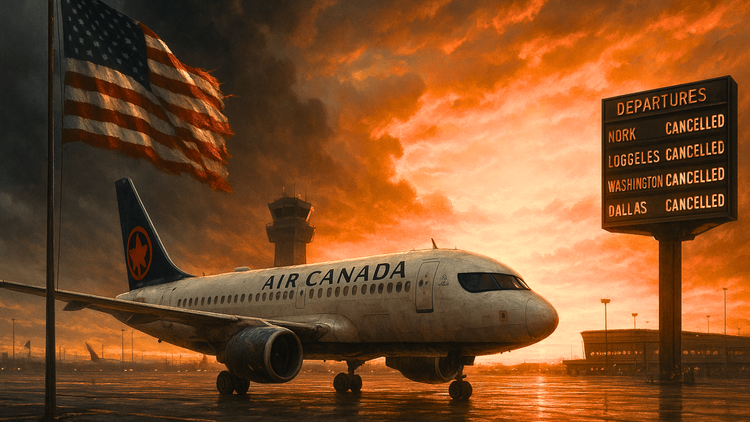Grounded No More: Air Canada Pilots Ratify New Contract
New Contract Paves the Way for Enhanced Compensation and Work-Life Balance for Pilots

In a significant move for the airline industry, Air Canada pilots have overwhelmingly voted in favor of a new tentative agreement with the airline, effectively alleviating concerns of a potential strike. This decision not only brings relief to management but also allows passengers to breathe easier, knowing that air travel disruptions have been averted.
Strong Support for the Agreement
On Thursday, the Air Line Pilots Association announced that a substantial 67 percent of the airline's roughly 5,400 pilots voted in favor of the new contract. This vote represents a significant endorsement of the terms negotiated over more than a year of discussions, signaling a commitment from the pilots to support the agreement and the airline's future.
Significant Wage Increases
At the heart of the new contract is a cumulative wage increase of nearly 42 percent over the next four years. This increase is particularly noteworthy as it surpasses the wage gains achieved last year by pilots at the three largest U.S. airlines, which ranged from 34 to 40 percent but started from a higher pay baseline. Such a substantial raise showcases the airline's recognition of the pilots' contributions and their role in the airline's success.
Diverse Perspectives Among Pilots
Despite the overall approval, the fact that roughly one-third of Air Canada pilots voted against the agreement highlights ongoing divisions within the ranks. Key concerns include issues such as scheduling, quality of life, and a pronounced pay gap between newer pilots and their more experienced counterparts. These issues reveal that while the pay hike is a significant win, not all pilots feel fully satisfied with the contract.
Charlene Hudy, the head of the union’s Air Canada contingent, expressed that the contract symbolizes Air Canada's commitment to its pilots. In a statement released on Thursday, she emphasized, "This agreement helps restore what Air Canada pilots have lost over the past two decades and creates a strong foundation from which to build on." Hudy's words reflect the union's belief that this contract is a pivotal step in improving pilots' conditions and compensation.
Air Canada's Response
Air Canada management welcomed the pilots' approval, indicating that the agreement is mutually beneficial. CEO Michael Rousseau stated, "The agreement keeps our pilots the best compensated in Canada and provides the work-life balance improvements they were seeking." This sentiment underscores the airline's intention to foster a supportive work environment while maintaining operational flexibility for future growth.
Negotiation Highlights
The tentative contract was forged in mid-September after extensive negotiations, highlighting the complexities of labor relations within the airline industry. The agreement not only addresses compensation but also outlines improvements in work-life balance—an increasingly critical factor for pilots in a demanding industry.
Avoiding Potential Disruptions
One of the most pressing concerns surrounding the negotiations was the possibility of a strike, which could have resulted in approximately 670 flight cancellations, affecting around 110,000 passengers daily. The approval of the contract thus avoids significant disruptions to air travel and maintains a level of stability in the industry.
In the lead-up to the vote, the union held a series of roadshows to communicate the details of the proposed agreement to its members. This proactive approach aimed to ensure that pilots were well-informed about the terms and implications of the contract, facilitating an educated voting process.
Unity and Division
Hudy’s warning to her colleagues during a virtual town hall—that she would resign if the agreement were rejected—added a layer of urgency to the decision-making process. Her commitment to the pilots' welfare and the potential consequences of a rejection highlight the complexities of union dynamics and leadership accountability.
High Participation Rates
Remarkably, about 99 percent of eligible pilots participated in the ratification vote, indicating a strong engagement among the pilots. This high turnout reflects the pilots’ vested interest in the outcome of the negotiations and their willingness to voice their opinions on such critical issues.
Effective Date and Future Implications
The new contract takes effect immediately, retroactively dated to September 2023, and will expire on September 29, 2027. This timeline not only solidifies the pilots' new wage structure but also sets the stage for ongoing discussions about their working conditions in the future.
Conclusion
The Air Canada pilots' approval of the new contract marks a significant moment in the airline's history, providing much-needed stability for both the airline and its employees. While the wage increases are commendable, the discussions surrounding scheduling and quality of life issues will likely continue as the pilots strive for further improvements. As the aviation industry evolves, the agreement sets a precedent for labor negotiations, showcasing the importance of collaboration and understanding between management and employees.






